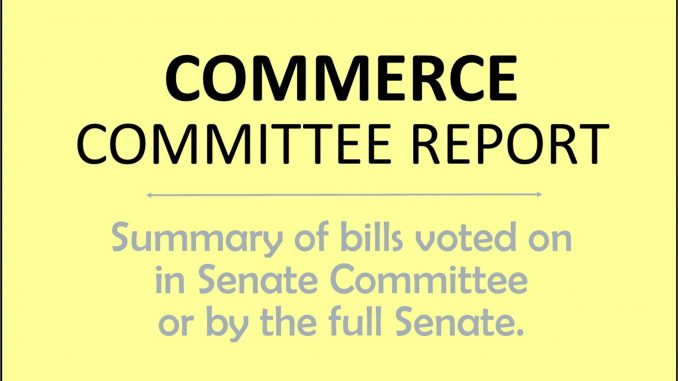
On this page
OMMITTEE ACTION
SF 2231 – Regulation of Pharmacy Benefits Managers
SF 2231 (SF 2092) addresses pharmacy benefits managers (PBM). It requires PBMs to allow pharmacies in Iowa to participate in a pharmacy network if the pharmacy accepts the same terms and conditions as those the PBM imposes on the pharmacies in the network.
A PBM can’t prohibit a pharmacy from disclosing the availability of a lower-cost drug option or from selling a lower-cost drug option to a covered person. Any amount paid by a covered person for that drug must be applied to any deductible imposed by the covered person’s health benefit plan. A PBM cannot impose different cost-sharing or additional fees based on the pharmacy where a person fills a prescription.
A PBM cannot require a person, as a condition of payment or reimbursement, to purchase pharmacy services, exclusively through a mail-order pharmacy. A covered person’s cost-sharing for a drug is calculated at the point-of-sale based on a price that is reduced by an amount equal to at least 100% of all rebates that have been received, or that will be received, by the health carrier or a PBM in connection with the dispensing or administration of the drug.
A PBM must include any amount paid by a covered person, or by any other person on behalf of a covered person, when calculating the covered person’s total contribution toward the covered person’s cost-sharing. A pharmacy may decline to dispense a drug if, as a result of the maximum allowable cost list, the pharmacy will be reimbursed less than the pharmacy’s acquisition cost.
After the date of receipt of a “clean claim” submitted by the pharmacy, a PBM cannot retroactively reduce payment on the claim. Payment can be reduced if the claim is found not to be a “clean claim” during the course of a routine audit. A PBM must provide a process for pharmacies to appeal a maximum allowable cost or a reimbursement.
The Insurance Commissioner must take any enforcement action under the Commissioner’s authority to enforce compliance, and adopt rules to administer the bill. Committee members indicated that the proposal needs additional refinement and clarifications. They will continue to work with stakeholders and consider suggestions made by the Iowa Insurance Division.
[2/8: short form]
SF 2232 – Certification requirements of water filter systems
SF 2232 (SSB 3056) eliminates the requirement that a consumer of a water treatment system be provided the manufacturer’s performance data sheet or a consumer information pamphlet compiled by the Department of Public Health. Iowa is the only state with this requirement. The bill does not affect the Code sections in Chapter 714 that relate to the sale, lease, rental or advertisement of a water treatment system.
Several types of remedies are available if a court finds that a person has committed an unlawful practice, including injunctive relief, disgorgement of moneys or property, and a civil penalty not to exceed $40,000 per violation. The bill takes effect January 1, 2023.
Those registered as monitoring the legislation include the Attorney General/Consumer Protection Division, Iowa State Bar Association, Iowa Departments of Public Health and Natural Resources and the Iowa Sierra Club.
[2/8: short form]
SF 2233 – Land surveyor measurement standards
SF 2233 (SF 2137) updates survey measurement standards to comply with “legal definition” changes made by the U.S. Bureau of Standards. This will make Iowa Code mirror the National Geodetic Survey definitions. SF 2233 also deletes Code sections relating to the Iowa State Plane Coordinate System, which are no longer needed with the changes made in Code 355.16. The Society of Land Surveyors of Iowa supports the legislation.
[2/8: short form]
SF 2237 – Financial reports by insurance company holding systems
SF 2237 (SSB 3062) is an Iowa Insurance Division recommendation modifying to Iowa Code Chapter 521A regarding the Group Capital Calculation (GCC) and the Liquidity Stress Test (LST). The proposal is based on a model act from the National Association of Insurance Commissioners that will become an accreditation requirement.
The State of Iowa, one of the lead regulators of U.S. groups of insurers operating in the European Union (EU) or the United Kingdom (UK), must have legislation in place by November 7, 2022 to comply with the Covered Agreement between the U.S., EU and UK. If not, any supervisor in the EU or UK could impose its own group capital calculation on a U.S. group operating in the EU or UK and all of the U.S. insurers within that group.
The GCC is formulated to better understand an insurance group’s financial risk profile to enhance policyholder protection. Iowa is the lead U.S. regulator and/or international group-wide supervisor for several U.S. groups with international operations in various regions, including the EU and UK. Regulators of groups with international activities in the EU or UK should have the GCC language in place to comply with the Covered Agreement, which requires a methodology for measuring group capital.
The LST was developed to assess and monitor industry-wide and is required for companies meeting the Scope Criteria for activities identified as having possible heightened liquidity risks. Due to the nature of business for many Iowa domestic insurers, Iowa will likely continue to have several companies that must participate in the LST. As a secondary benefit, the LST results for an individual group will provide enhanced supervisory benefit to the Iowa regulators in monitoring individual group liquidity risks.
Companion bill HF 2217 is on the House Calendar. The legislation is supported by the Federation of Iowa Insurers, Independent Insurance Agents of Iowa, Principal Financial Group, and the American Property Casualty Insurance Association.
[2/8: short form]
